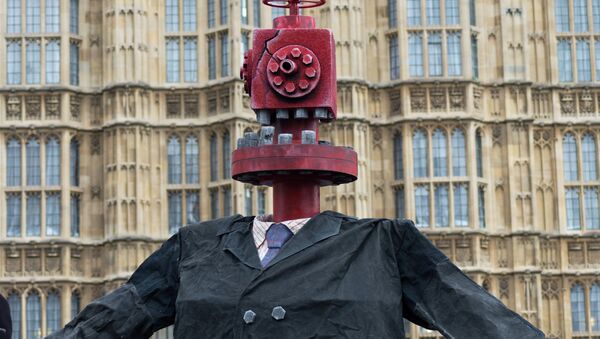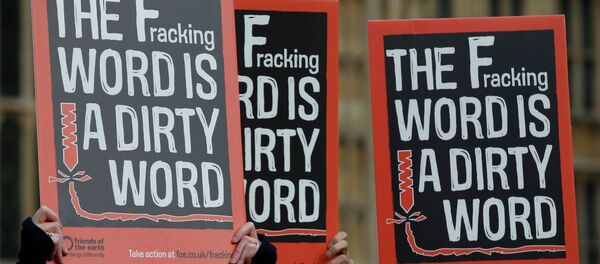The changes announced today by the Secretaries of State for Energy and Climate Change and for Communities and Local Government give the councils a deadline of 16 weeks to approve or reject applications; after then, ministers will have the power to call them in and make a decision themselves.
"To get shale exp up and running we can’t have system that sees applications drag out for months, even years on end" http://t.co/Ej6FvcUKzq
— DECC (@DECCgovuk) August 13, 2015
The decision comes on the wings of a protracted battle between energy companies keen on fracking and local councils in Lancashire and North Yorkshire striving to protect the beautiful nature of North England and health and safety of its residents.
.@wwwfoecouk It's not about gas vs. renewables. Our energy supply must be safe, low cost and low carbon — gas is a part of that.
— DECC (@DECCgovuk) August 13, 2015
Announcing the decision, Communities Secretary Greg Clark said:
"By fast tracking any appropriate applications today's changes will tackle potential hold ups in the system."
But the locals are concerned about the impact of fracking, which involves pumping a mix of chemicals and water under high pressure into shale formations to force them to release oil and gas. Test fracking has already resulted in a minor earthquake in Lancashire, and there are also concerns that chemicals can escape into the ground water.
Although unrelated to fracking the latest scare regarding contamination of the mains water supply in Blackpool, Preston, Chorley, Fylde, Wyre and South Ribble with the cryptosporidium parasite has highlighted the risks and impact of water pollution on local communities.
The energy companies have long been arguing that fracking technology is well developed and safe, against all opposition by the locals and their elected representatives. Defending their recent decision to appeal against the rejection by the local council of two applications, Francis Egan, CEO of Cuadrilla, said:
"I understand that some people would prefer that we did not appeal but I am confident that we will demonstrate to Lancashire and the UK that shale gas exploration and fracking is not only safe but represents a very real opportunity to create jobs, fuel businesses, heat UK homes and stimulate significant local economic growth."
Tories will do anything to get fracking in the UK, even if it trashes their 'localism' agenda http://t.co/9rMNT1P2WG pic.twitter.com/RarlEFp9uZ
— Joe Sandler Clarke (@JSandlerClarke) August 13, 2015
Cuadrilla's arguments have now been echoed by Energy and Climate Change Secretary Amber Rudd:
"…we are backing the safe development of shale gas because it's good for jobs giving hardworking people and their families more financial security, good for our energy security and part of our plan to decarbonise the economy… We now need, above all else, a system that delivers timely planning decisions and works effectively for local people and developers."
Worth remembering that @CuadrillaUK actually requested extensions to the #planning process for its applications with @LancashireCC #fracking
— Catherine Early (@Cat_Early76) August 13, 2015
The developers are the ones who would benefit most from the changes, says Nick Clack, senior energy campaigner at the Campaign to Protect Rural England (CPRE):
"Taken with the weak statutory safeguards proposed for protected areas, today's fracking announcement suggests a wish to create a fracking regime that works more effectively for developers than for local people and the environment."
Unlike fracking for conventional oil and gas, fracking for shale gas requires multiple wells.
Researchers at Durham University have warned that it could cause the "industrialization" of the countryside because of the number of wells and the traffic. In North England alone it will require thousands of wells to extract just 10% of the shale gas reserves.
Nick Clack of CPRE believes that today's move is both out of step with recent approaches to planning for new energy infrastructure, and highly concerning in removing decision-making power from local communities.
Last May, the government said it plans to transfer consenting power for large onshore wind from the energy minister to local planning authorities in England.
I am Cuadrilla!!! HA HA HA! — I have come to frack your land up! @cuadrillauk #cuadrillauk #godzilla pic.twitter.com/Xe9V1xsLxM
— Tom Carnell (@tccarnell) June 29, 2015
To Labour's Shadow Secretary of State for Energy and Climate Change, Caroline Flint, the government is "clearly guilty of double standards."
Advocating broader local conversations about what appropriate energy projects might look like, Nick Clack of CPRE says:
"Ministers talk of a national need for shale gas and oil, but have yet to make a convincing case to communities. These changes, which could see Government taking more decisions away from local people, won't help to persuade them and could fuel division and disempowerment."
It sounds disingenuous for the Government to claim that local communities will remain fully involved in shale gas and oil planning decisions if these decisions are ultimately taken by ministers."




